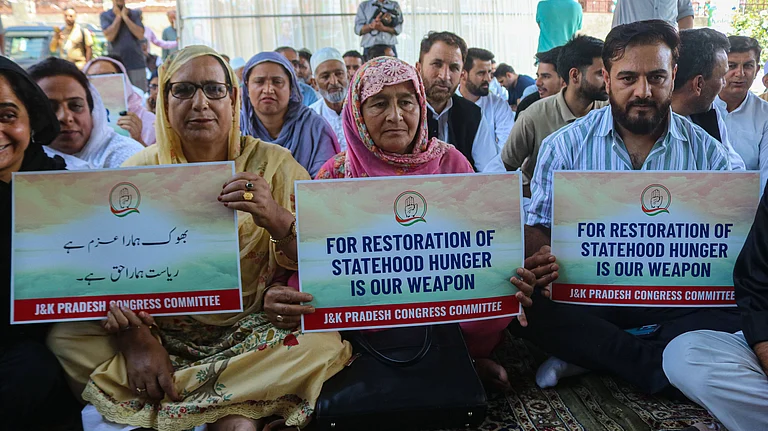Political parties have called for increasing the eligibility period of fifteen years of residency for non-locals to obtain domicile status
CM Omar Abdullah has sought parity with Ladakh on the domicile issue
Apni Party has demanded a fifty-year residency requirement for domicile eligibility
In Rare Form, J&K Political Parties Are In Consensus On Residency Period For Non-Locals
A consensus has emerged across the political spectrum over limiting domicile rights to non-locals by keeping a cap of a fifty-year residency requirement in Jammu and Kashmir
It is not often that every party in Jammu and Kashmir agrees. But, in a surprising move, political divisions have blurred with Chief Minister Omar Abdullah and other political parties in consensus over increasing the residency requirement for issuing domicile certificates to non-locals. Abdullah has slammed the Central government for treating Jammu and Kashmir differently from Ladakh where, unlike Kashmir, the non-locals will become eligible for domicile rights after 2034.
The political parties have sought to increase the eligibility period of residency from the existing fifteen years for non-locals to get domicile status in Jammu and Kashmir. Chief Minister Omar Abdullah, on Saturday, said that there should be parity with the Union Territory of Ladakh on the domicile rules. Domicile status is the basis for securing government jobs.
Addressing a press conference, Omar said, “Two Union Territories (Ladakh and Jammu and Kashmir) were born out of one state on the 5th of August, 2019, yet in some respects Jammu and Kashmir has been treated very differently from Ladakh. One of those areas is the area of domicile law, which I believe is something that needs to be brought at par.”
Earlier, former Minister and president of Jammu and Kashmir Apni Party, Altaf Bukhari, said that the CM Omar should set a fifty-year residency requirement for domicile eligibility. He said that since Omar holds the revenue portfolio, changing the domicile rules lies within his authority. “Extending the residency requirement from the current 15 years to 50 years would be a remarkable contribution by this government,” he said. However, Omar indicated that the call lies with the Centre.
Senior Vice President of Apni Party, Ghulam Hassan Mir, says that they have been the first to raise the issue of protecting the land and jobs for local Kashmiris. “We fought to protect the domicile rights, and it is due to our efforts that only a restricted number of domicile certificates have been issued to the non-locals. We are seeking that the rights to buy land or to apply for government jobs should be limited to the local people only.”
In 2020, the Ministry of Home Affairs introduced new domicile rules for Jammu and Kashmir, and amended the Jammu and Kashmir Civil Services (Decentralisation and Recruitment Act) to replace the permanent resident certificates (PRCs) with the domicile certificates. Under the new rules, among the conditions that were laid for getting the domicile certificate were that a person should have resided for fifteen years in the UT.
The other people to be eligible were those who would have studied for seven years and appeared in class 10th and 12th examinations in an educational institution, as well as the children of central government employees, including those posted in the central universities, who have served in the Union Territory for ten years.
However, in Ladakh, a prospective rule was brought with a person required to have resided for fifteen years from 2019 onwards to be eligible for the domicile rights.
In April this year, the Jammu and Kashmir government said in the Legislative Assembly that over eighty-three thousand domicile certificates have been issued to non-state subjects in the Union Territory over the past two years.
NC’s MLA Beerwah, Mohammad Shafi Wani, says that the domicile certificates were also issued in his constituency in central Kashmir’s Budgam district, where several non-local women who have married local Kashmiris have received the domicile certificates.
“The impact of the domiciles getting issued in large numbers to the non-locals was heavy in the Jammu region,” he says. NC has been vocal in its opposition that the local people have been made to compete with outsiders for jobs and has sought that the sale of land to non-locals should be restricted, while also seeking the restoration of Article 370.
The NC’s coalition partner in Jammu and Kashmir, Congress, has also weighed in on the issue, advocating for the need to restrict the sale of land to non-locals and reserve government jobs for local people only. Senior Congress leader Ghulam Nabi Monga says that the party has sought that the position that existed in Jammu and Kashmir before the revocation of Article 370 on August 5, 2019, should be restored, but until the restoration of the pre-August 5 position, the steps need to be taken to protect the local demography.
“There is a need for a political consensus over the issue, and the requirement of residency eligibility for the domicile rights should be enhanced from the current fifteen years to fifty," he says.




